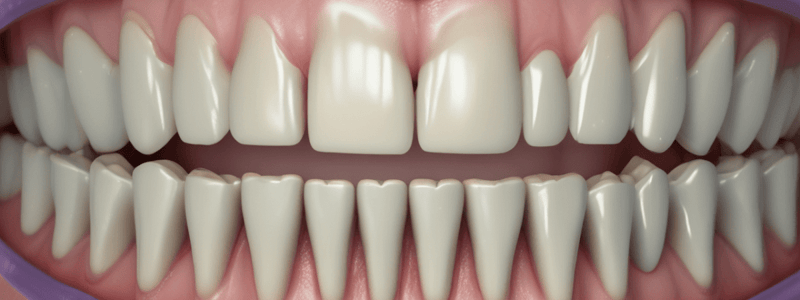Podcast
Questions and Answers
What is the primary function of occlusal contact between each tooth in one arch and its antagonist in the opposing arch in centric occlusion?
What is the primary function of occlusal contact between each tooth in one arch and its antagonist in the opposing arch in centric occlusion?
- To maintain the mesial migration of the teeth in the same arch
- To increase the occlusal forces on individual teeth
- To prevent the over eruption of the teeth of the opposing arch (correct)
- To guide the mandibular movement
What is the characteristic of the space between the mandibular dental arch and the maxillary dental arch when the occlusal relation is changed?
What is the characteristic of the space between the mandibular dental arch and the maxillary dental arch when the occlusal relation is changed?
- The space decreases in centric occlusion and increases in lateral relation (correct)
- The space increases in centric occlusion and decreases in lateral relation
- The space remains constant
- The space is not affected by the occlusal relation
Which of the following teeth does not occlude with two teeth in the opposing arch in centric occlusion?
Which of the following teeth does not occlude with two teeth in the opposing arch in centric occlusion?
- Mandibular canines
- Mandibular central incisors (correct)
- Maxillary third molars
- Maxillary central incisors
What is the effect of occlusal contact on the distribution of occlusal forces in centric occlusion?
What is the effect of occlusal contact on the distribution of occlusal forces in centric occlusion?
What type of mandibular movement is characterized by protrusion and retrusion?
What type of mandibular movement is characterized by protrusion and retrusion?
What is the result of the mesial migration of the teeth in the same arch?
What is the result of the mesial migration of the teeth in the same arch?
What is the physiological rest position of the mandible?
What is the physiological rest position of the mandible?
What is the term for the space present between the occluding surface of maxillary teeth when the mandible is at the vertical dimension of rest position?
What is the term for the space present between the occluding surface of maxillary teeth when the mandible is at the vertical dimension of rest position?
What is the term for the maximum intercuspation or contact attained between maxillary and mandibular teeth?
What is the term for the maximum intercuspation or contact attained between maxillary and mandibular teeth?
What is the key of occlusion in the posterior teeth?
What is the key of occlusion in the posterior teeth?
What is the name of the occlusion that occurs when the maxillary teeth overlap the mandibular teeth in an anterior relationship and a cusp to fossa relationship in the posterior teeth?
What is the name of the occlusion that occurs when the maxillary teeth overlap the mandibular teeth in an anterior relationship and a cusp to fossa relationship in the posterior teeth?
What is required for perfect harmony between teeth, TMJ, and neuromuscular system?
What is required for perfect harmony between teeth, TMJ, and neuromuscular system?
What is the primary function of the overbite relationship in centric occlusion?
What is the primary function of the overbite relationship in centric occlusion?
What is the purpose of the compensatory curvatures of the dental arches?
What is the purpose of the compensatory curvatures of the dental arches?
What is the characteristic of the maxillary arch compared to the mandibular arch?
What is the characteristic of the maxillary arch compared to the mandibular arch?
What is the position of the mandible in centric relation?
What is the position of the mandible in centric relation?
What is the term for the horizontal relation of the upper teeth to the lower teeth in centric occlusion?
What is the term for the horizontal relation of the upper teeth to the lower teeth in centric occlusion?
What is the term for the vertical relation of the upper teeth to the lower teeth in centric occlusion?
What is the term for the vertical relation of the upper teeth to the lower teeth in centric occlusion?
What type of cusps contact respective fossa to support the vertical dimension?
What type of cusps contact respective fossa to support the vertical dimension?
What is the part of the tooth where supporting cusp comes to a stop in maximum intercuspation?
What is the part of the tooth where supporting cusp comes to a stop in maximum intercuspation?
In which relation does the condyle move forward and downward, bringing the teeth forward?
In which relation does the condyle move forward and downward, bringing the teeth forward?
What is the guidance provided by the overlap of the upper and lower anterior teeth?
What is the guidance provided by the overlap of the upper and lower anterior teeth?
In the masticatory cycle of posterior teeth, which side shows contact of lingual cusps of the maxillary teeth with the buccal cusps of mandibular teeth?
In the masticatory cycle of posterior teeth, which side shows contact of lingual cusps of the maxillary teeth with the buccal cusps of mandibular teeth?
In the masticatory cycle of anterior teeth, where is the balancing side located?
In the masticatory cycle of anterior teeth, where is the balancing side located?
What direction do the roots of all teeth incline except for the 2nd premolar and mandibular molars?
What direction do the roots of all teeth incline except for the 2nd premolar and mandibular molars?
What is the characteristic of the incisal and occlusal surfaces of teeth?
What is the characteristic of the incisal and occlusal surfaces of teeth?
During centric occlusion, what occurs when the cusps and incisal ridges of teeth come into contact?
During centric occlusion, what occurs when the cusps and incisal ridges of teeth come into contact?
What is the purpose of the spaces that appear around the point of contact between curved surfaces during centric occlusion?
What is the purpose of the spaces that appear around the point of contact between curved surfaces during centric occlusion?
Which direction do the roots of the upper incisors incline?
Which direction do the roots of the upper incisors incline?
What is the result of the curved surfaces of teeth coming into contact during centric occlusion?
What is the result of the curved surfaces of teeth coming into contact during centric occlusion?
What is the radius of the sphere that the mandibular arch conforms to in the vertical plane?
What is the radius of the sphere that the mandibular arch conforms to in the vertical plane?
What is the characteristic of the curve of Spee in the mandibular arch?
What is the characteristic of the curve of Spee in the mandibular arch?
What is the direction of inclination of the crowns of mandibular posterior teeth?
What is the direction of inclination of the crowns of mandibular posterior teeth?
What is the shape of the curve of Monson?
What is the shape of the curve of Monson?
What is the length of the sides of Bonwill's Triangle?
What is the length of the sides of Bonwill's Triangle?
What is the location of the apex of Bonwill's Triangle?
What is the location of the apex of Bonwill's Triangle?
What is the direction of inclination of the crowns of maxillary posterior teeth?
What is the direction of inclination of the crowns of maxillary posterior teeth?
What is the shape of the curve of Wilson in the coronal plane?
What is the shape of the curve of Wilson in the coronal plane?
What is the reason for the inclination of teeth in the mandibular arch?
What is the reason for the inclination of teeth in the mandibular arch?
What is the result of extending the curve of Spee?
What is the result of extending the curve of Spee?
What is the direction of alignment of the long axis of each lower tooth?
What is the direction of alignment of the long axis of each lower tooth?
Flashcards
Occlusal Space Variation
Occlusal Space Variation
The space between opposing teeth changes depending on jaw movement, being smaller in centric occlusion and larger in lateral movements.
Centric Occlusion
Centric Occlusion
The maximum intercuspation of teeth when the jaw is in its most closed position.
Centric Relation
Centric Relation
The position of the mandible where the condyles are in the glenoid fossae.
Freeway Space
Freeway Space
Signup and view all the flashcards
Supporting Cusps
Supporting Cusps
Signup and view all the flashcards
Guiding Cusps
Guiding Cusps
Signup and view all the flashcards
Overbite
Overbite
Signup and view all the flashcards
Overjet
Overjet
Signup and view all the flashcards
Curve of Spee
Curve of Spee
Signup and view all the flashcards
Curve of Wilson
Curve of Wilson
Signup and view all the flashcards
Curve of Monson
Curve of Monson
Signup and view all the flashcards
Bonwill's Triangle
Bonwill's Triangle
Signup and view all the flashcards
Functional Tooth Form
Functional Tooth Form
Signup and view all the flashcards
Study Notes
Occlusion and Mandibular Relationships
- Occlusal space varies with movements: reduced in centric occlusion, increased in lateral relation.
- In centric occlusion, most teeth occlude with two opposing teeth; exceptions include mandibular central incisors and maxillary third molars.
- Key functions of occlusal relationships:
- Prevents over-eruption of opposing arch teeth.
- Prevents mesial migration within the same arch.
- Distributes occlusal forces across multiple teeth.
Mandibular Movements
- Types of mandibular movements:
- Symmetrical bilateral: Includes depression, elevation, protrusion, and retrusion.
- Asymmetrical bilateral: Involves right and left lateral movements.
- Supporting cusps (buccal cusps of lower posteriors and lingual cusps of upper posteriors) contact respective fossae during occlusion, which supports vertical dimension.
- Guiding cusps (buccal cusp of upper posteriors and lingual cusp of lower posteriors) help guide teeth into occlusion.
Occlusal Contacts
- In centric occlusion, contact points referred to as "centric stops" occur where cusps reach maximum intercuspation (e.g., central fossa of mandibular first molar).
- Protrusive relation results in edge-to-edge contact of anterior teeth, with minimal contact in the posterior region.
- During lateral movements, the working side has contact while the balancing side typically does not.
Freeway Space
- Freeway space measures 2-5mm between maxillary and mandibular teeth at rest.
- Centric occlusion features maxillary teeth overlapping mandibular teeth anteriorly and cusp to fossa relations posteriorly.
Types of Occlusion
- Centric occlusion is also classified as convenience occlusion, representing the maximum contact between opposing teeth.
- Centric relation defines the non-strained position of the mandible with condyles resting in the glenoid fossa.
Dental Arch Form and Overlap
- Maxillary arch outline is larger than the mandibular arch, allowing for overbite and overjet.
- Overbite measures vertical relation; overjet measures horizontal relation in centric occlusion.
- These relationships help prevent soft tissue bites and guide mandibular movement.
Compensatory Curvatures of Dental Arches
- Curvatures assist in guiding mandibular movement and balance:
- Curve of Spee: Follows the arc from incisal to condylar surface.
- Curve of Wilson: Seen in the coronal plane, showing inclination differences of posterior teeth.
- Curve of Monson: Extends existing curves into a sphere reflecting vertical occlusal appearance.
Bonwill's Triangle
- Defines the mandible’s structure, forming an equilateral triangle measuring 4 inches, centered at the condylar areas.
Tooth Inclination and Angulation
- Variations in root inclination affect occlusal function and stability during mastication; most teeth have lingual root inclination, with exceptions for certain premolars and mandibular molars.
- Proper angling provides optimal occlusal function and teeth alignment.
Functional Teeth Form
- Teeth lack flat surfaces; cusps and incisal ridges function as cutting edges during contact, forming escapement spaces around points of contact to facilitate efficient chewing and mastication.
Studying That Suits You
Use AI to generate personalized quizzes and flashcards to suit your learning preferences.




